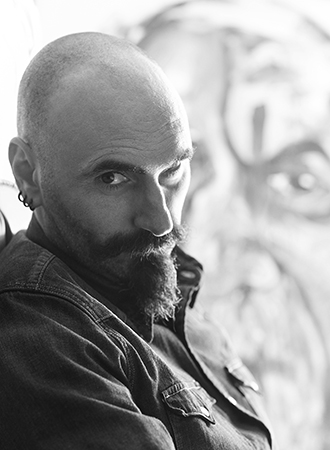“Then I saw another beast that rose out of the earth: it had two horns like a lamb and it spoke like a dragon:” Feminine jouissance is an epicene direction of the ethic of the geometry of the kinesis itself- an effeminated return of the psychoanalyst to the world asking, now, different questions, to that which is the scene of the Real, not perversion but reversion of the object of the drive and the object causing that desire in question, which is between two telluric grounds: and he who analyses with musicality, avowedly been seraphic devout to Freud’s timelessness of the unconscious and to the amaranthine of its faculty, do so by his paraphernalia and a singular apparatus that is a phallus itself- such a process is not Freudian in ethic and unquestionably not an Ex-ascesis: it shall not be called an analysis: lo and behold of such analysts who still measure the salamander’s tail in centimeters.
“For the mystery of lawlessness is already at work, but only until the one who now restrains it is removed:” And, where the subject in the royal combat of ex-instance, and of the monotonic sound of a voice hoisting the enchantment of structure, struggles with the signifiers’ repression and the Real of his desire- a no-meaning but a letter’s ability to notion, not only witching a discourse that is of the Other- the mandate to a desiring subject-matter is this: do not listen to those father confessors of an unfaithful longing, saying, that nothing can be said about the Real because the Real is the Ethic, for, the responsibility of the psychoanalytic Ascesis requires that psychoanalysts should, unless they crease their hands and dedicate the offer of endowment to a discipline of a diverse rogation· and, when you encounter the object, do not shroud it but make a contribution of your being to its caressing with the words of he who has returned with new questions, until that, that which is an imaginary aim and object becomes a Real source for the love of silence, for it is there that the Verbificated Subject of the unconscious acts: it is this: that he who did not experience the indomitable hostility and Energeia of life soaks a speech, to converse for that which cannot be said- a joker would christen this as an irony in case an impostor could giggle without enjoying the astounding of the Other: and yet, it is not truly funny· for, that which cannot be said, indeed, is an unmasked alphabet for he who cannot read the repressed ethic with precision: the silence of that which cannot be said is not a kingdom come for him who has already spoken∙ he who knows how to Act, Acts- and the analyst whose symptom has not been beaten by the toxic capacity of life cannot analyze with accuracy· it is those who address hunger with a filled stomach and ask their masters How do I encounter that which cannot be said, only to receive the retort that this riddle of such a stumble upon is to advocate the talking: indeed, it is true when one does not know what is an Act- of faith.
“Then I saw the beast and the kings of the earth with their armies gathered to make war against the rider on the horse and against his army:” For, the scene and the world are Asceses themselves, one after the other yet not wrinkled to a diameter: and when the Voice and the spell descried of their the source, the Voice is such for the curse of the signifier, with he who has returned from the Principle which is Nirvana and not pleasure, the returned of the repressed ethic of desire, of that which is the Ousia of psychoanalysis, and the, when, the Verb brings to the world, from the scene, negativising the amount of the phallus and the ways analysts calculate the distance, end to end, of a salamander’s appendage, the ethic and destiny of the scene with the oblige of the drive- and yet subtracted from its object and having its source devoiced of the body- a kenosis by all means equaling poetry, no other art: the real is that which is symbolized in the Aether∙ a signifying symbioses of the discourse, the body, the Other, not of the Apeiron: and if that schizophrenic, him, him of the psychotic structure whom the analysts mistakenly are urged to speak of as ordinary and are advised to look for other cryptograms because they cannot read the ways of foreclosure, trapped within the symptoms’ ways after all, because their ears have been deafened to appreciate the ways of the Letters, seems to be dancing in an obsessive holy ceremony, under the pressure to finish Nothing∙ it is so, the jester has said, because one’s earlobes’ wax renders him inoperative to perceive the motion of the Everything: that, this analysand, is not finishing Nothing but attempts to start the Everything· such are the traditions of the death drive, absolute and further than the pleasure principle, because the Αρχή, that which an apologist may entitle as the Ethic, has not been sculpted: this subject attempts to furnish the Apeiron with a foundation, a creation, for only in that pencil case he would encompass the change to silhouette the brea-d-th of the Ethic: the Lung-uage is not static: neither imaginary, because identifications are condensations of the signifiers whilst painting the image∙ the language organ, of that reckless colorless green ideas, is truly a Lunguage Organ: and it is not the Phallus.
“The son of destruction, who opposes and exalts himself above every so-called god or religion, so that he takes his seat in the temple of God, declaring himself to be God:” And because correctly the letter is placed, not in the rest of the object but to the Kinesis of that which is curtained by the object- the Act of desire and not its mere articulation: the act can only grasp the same geography of kinesis and the creation is the comportment by which the subject’s penitentiary is zeroed, for, that is the phenomenological of that which is named and envelopes the Ousia within the signifier sacrificing desire∙ and for such a creation, naming is not enough: naming is the shenanigan of a somnolent God whose object does not revisit the world with new questions from the Nirvana of his No-Body enjoyment· behold, for the articulation of a truth in psychoanalysis, one that does not involve the Act, is the bertha of that truth: desire cannot exist without the Act and the subject of the unconscious cannot exist without the verb.
“And I saw three foul spirits like frogs coming from the mouth of the dragon, from the mouth of the beast, and from the mouth of the false prophet:” and such, it is exemplified, because the cause and effect perfects the icon of the imaginary. and yet is a stasis: and, when the abyss ascribing the e-xpelled and hypothetical circumspection of the Other, be that of the object or the function of the other as the optic signification of the world, the subject’s desire is a donation from the Nirvana, which is the motion, of the scene to the world that is of the comic anecdote, laughing at the seven-heated beast, who is of an apocalypse but itself cannot reveal whatever thing, that, that moment is when the Antichrist of time, an embodiment of a Sadducee, bothers itself with the riddle of the chicken and the egg, a true evil to the synchronicity of life and of the Letter- an unfaithful of a malevolence natural history who secretly believes in the order of time and morasses, that, for one to become an analyst something from his ancient times’ experience ought to be the cause of this effect: a foolhardy impostor by all means∙ and, the impostor cannot hear that the scripture’s letters, enclosed within the signifiers, voice that no good has ever came from those whose ethic is imaginary- phallic in its nature- insisting that for an analyst there ought to be something from his past experience and signifiers excusing and answering the why this subject wants to practice psychoanalysis: these hypocrites who are not even actors, who errand an idyllic romance for psychoanalysis, themselves finding irresistible the signifiers of industrializing Freud, judge their reliance to the One analyst whose symptom becomes an principle- that is not how the supplication functions, neither sublimation, and undoubtedly the doorstep of the act has put up chains for them· they are not proficient of passing through the ‘I’ of the need-le: Again, I tell you, it is easier for a camel to go through the eye of a needle than for a rich man to enter the kingdom of God– for, this is the Antichrist of time with a cause and effect- no Freudian: it is not something but Everything in ones’ experience because the Sinthome derives not ex nihilo neither from a point that is a sign, but ex Apeiron- from an Ex-Ascesis∙ and, regarding time, we could say somehting funny about synchronicity without cause and effect because the drive’s object becomes a source: and for that, a subject needs honesty: but the impostors cannot accept it, as they are in search to create a sort of a sacred game.
“And the devil who had deceived them was thrown into the lake of fire and sulfur, where the beast and the false prophet were, and they will be tormented day and night forever and ever:” and let us not write about impetration but of interpretation: that which ought not to serve the military service of a quarantine to the points of Kinesis∙ it is then, and only then, that we can articulate that the era of interpretation is over- if the Kinesis has becomes static- for it is not the drive that moves through the signifiers of a discourse, itself stabilized within and surrounded by the signifiers’ repetition, but the object, since the Voice and the spell, and the disability to not-not named the Ousia because a named Ousia becomes a god or an Orgone and then detached from the world by staging a scene of its own, a Disavowal of responsibility and a castle of enjoyment: privation’s venture cannot cope with the Alien but with the Other or the Same: thus the harmony of the spell is encountered by the science of Poetry and not the art of science, for, the returned of the repressed is the voice of desire and the ethic of the real: the real is the ethic: from the spell of language to the voice of lung-uage, given that the Άρχομαι του Λογου is a question: what is the purpose of the repressed ethic of my breathing speech, of the Lunguage of the Letter, the object cause, and the Breath- one should never name God but the Ethic: I desire, therefore I Act- definitely Acta non Verba.

